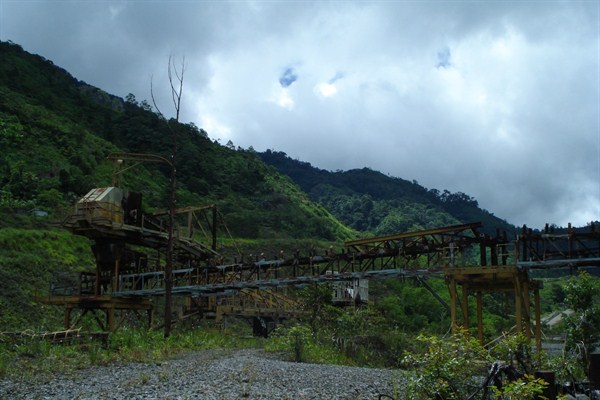ARAWA, Bougainville, Papua New Guinea—In late October, under overcast skies, a reggae band played to a crowd of several hundred people of all ages at an outdoor stage in Arawa, an old mining town framed by rainforest-covered mountains in the center of Bougainville Island. The crowd gradually grew as people, laden with bags of fresh produce, walked over from the large fruit and vegetable market situated directly opposite. The scene could have been confused for a music festival, but the band was only a warm-up act for the day’s main event: a political rally in favor of independence for Bougainville, the remote, easternmost archipelago region of Papua New Guinea.
The speakers who eventually took the stage—most of them ex-combatants from a former secessionist group called the Bougainville Revolutionary Army, some clad in battle fatigues and combat boots—urged the crowd to vote for “box 2,” or independence, in a long-awaited referendum on Bougainville’s political status. One of them, Chris Uma, reminded the audience of the suffering during what locals call “the crisis,” which began in 1989 when conflicts over the huge Panguna copper mine outside Arawa sparked a guerrilla insurgency against Papua New Guinea that lasted a decade. Uma argued that past colonial powers had exploited Bougainville for too long, and that full self-determination was the only path to justice for Bougainvilleans.
The referendum, a provision of Bougainville’s 2001 peace agreement with Papua New Guinea, gives voters two stated choices: “independence,” which would grant the region full sovereignty as a nation-state, and “greater autonomy,” which would retain the region’s status as an autonomous region of Papua New Guinea while affording it some additional powers. After years of preparation, expectations for the referendum are high in Bougainville, where polls opened Nov. 23 and will close on Dec. 7. Locals predict that an overwhelming majority of the more than 200,000 registered voters in Bougainville, as well as those abroad in the diaspora, will opt for independence, reflecting longstanding local resentment of foreign political control and external exploitation of the region’s wealth.

